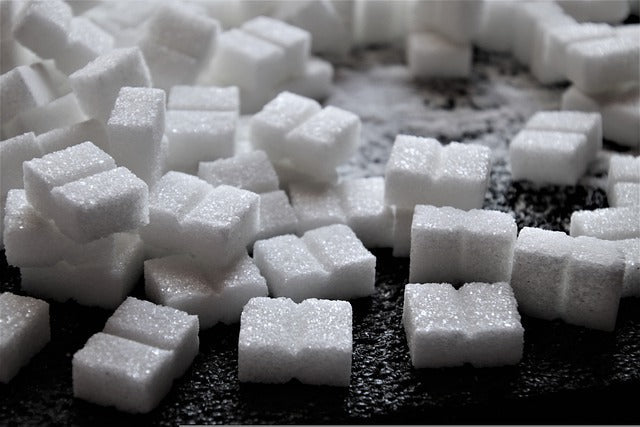Keto Sugar Replacements
Posted by Just Fitter on
When you are starting a keto diet the most essential and hardest element to get rid of is sugar. All our lives before starting a keto life almost all the food served in our table needs sugar to make it more delicious and appetizing. For those whose been with keto state would have different views on using sugar substitutes. As most would suggest a zero sugar as it may kick you off that keto state and would give you that cravings and makes it harder for you to keep up with the diet. Though it was mentioned that it gets easier in time some still resort and prefers to use keto sugar. Good News to your sweet tooth to satisfy, there are a lot in the market that can be used as sugar replacements.
Criteria of a good sugar substitute
- No impact to blood sugar levels
- Low net carbs and calories
- Must be safe and tested
- No side effects
- Can be heated safely
Top 6 Keto Sugar Replacements
Stevia is a natural sweetener derived from the Stevia rebaudiana plant. It’s considered a nonnutritive sweetener, which means that it contains little to no calories or carbs Unlike regular sugar, animal and human studies have shown that stevia may help lower blood sugar levels Stevia is available in both liquid and powdered form and can be used to sweeten everything from drinks to desserts.However, because it’s much sweeter than regular sugar, recipes require less stevia to achieve the same flavor.For each cup (200 grams) of sugar, substitute only 1 teaspoon (4 grams) of powdered stevia.
For some low carb or keto dieter sucralose is not part of the keto sugar replacement as it usually contains maltodextrin and dextrose which are both calories and carbs like the most popular sucralose based sweetener Splenda in which 1 packet contains 3 calories and 1 gram of carbohydrates. It is advisable though if for some who prefers splenda because of its favorable taste to be conscious about the amount you put in. Sucralose is not advised to use for baking keto pastries though.
Erythritol is a type of sugar alcohol a class of naturally occurring compounds that stimulate the sweet taste receptors on your tongue to mimic the taste of sugar.It’s up to 80% as sweet as regular sugar, yet it contains only 5% of the calories at just 0.2 calories per gram. Additionally, though erythritol has 4 grams of carbs per teaspoon (4 grams), studies show that it may help lower blood sugar levels in your body. Moreover, due to its smaller molecular weight, it typically doesn’t cause the digestive issues associated with other types of sugar alcohols.
For best results, swap about 1 1/3 cups (267 grams) of erythritol for each cup (200 grams) of sugar.
Xylitol is another type of sugar alcohol commonly found in products like sugar-free gum, candies and mints.It’s as sweet as sugar but contains just 3 calories per gram and 4 grams of carbs per teaspoon (4 grams).Yet, like other sugar alcohols, the carbs in xylitol don’t count as net carbs, as they don’t raise blood sugar or insulin levels to the extent sugar does.Xylitol can be easily added to tea, coffee, shakes or smoothies for a low-carb kick of flavor. It also works well in baked goods but may require a bit of extra liquid in the recipe, as it tends to absorb moisture and increase dryness. Because xylitol is as sweet as regular sugar, you can exchange it for sugar in a 1:1 ratio.
Note that xylitol has been associated with digestive problems when used in high doses, so scale back your intake if you notice any adverse effects
Monk fruit is a relatively new sugar substitute. Also called luo han guo, monk fruit was generally dried and used in herbal teas, soups and broths in Asian medicine. It was cultivated by monks in Northern Thailand and Southern China, hence its more popular name.Although the fruit in whole form contains fructose and sucrose, monk fruit’s intense sweetness is provided by non-caloric compounds called mogrosides, which can replace sugar. In 1995, Proctor & Gamble patented a method of solvent extraction of the mogrosides from monk fruit. The US FDA has ruled that monk fruit is generally regarded as safe. It has not yet been approved for sale by the European Union.Monk fruit sweetener does not raise blood sugar or insulin levels. It tastes better than stevia.It is also mixed with erythritol to improve use in cooking.It contains natural sugars and compounds called mogrosides, which are antioxidants that account for much of the sweetness of the fruit.
As the name suggests this sweetener came from the Yacon plant from South America. This sweet syrup contains fructooligosaccharides (FOS) which is a soluble fiber that can’t be digested by the body. It also contains several simple sugars, including sucrose, fructose and glucose. Yacon syrup is best used as a sweetener in place of sugar in coffee, tea, cereal or salad dressings.This sweetener is not to be used for baking as the fructooligosaccharides (FOS) can breakdown when exposed to high temperatures.
Conclusions:
Once one has decided to go on low carb or keto diet one of the thing that you need to give up is sugar to avoid being kick out from ketogenic state and insulin level to spike up. It is hard though to do this when you have live with sugar your whole life. For those ketogenic dieters it gets easier as it goes but of course it would be the hardest on the first few months. No need to worry because there are a lot of sugar substitute that you can use to ease that cravings. You just have to take not of the criteria of a good replacement.
Reference:
https://www.healthline.com/nutrition/keto-sweeteners#TOC_TITLE_HDR_7
https://www.dietdoctor.com/low-carb/keto/sweeteners
https://www.carbmanager.com/article/xtqe4beaaciaci7a/best-keto-friendly-sweeteners/










